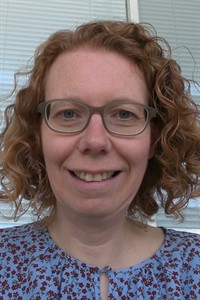Delphine Bard
Principal Scientist

Dr Delphine Bard is a physical chemist with over 20 years'
experience in the occupational measurement and characterization of
airborne particles. She is a principal scientist, who leads and
undertakes research and development work for the evaluation of
exposure and risks to hazardous dust, nanomaterial, new
technologies and advanced materials.
Her expertise includes knowledge of occupational health and
safety practices; exposure assessment and characterisation of
airborne particles, fibres and dust; aerosol measurement; risk
assessment and waste management.
Delphine is the HSE Science Division leading specialist in
nanomaterial and ultrafine particles exposure assessment. She
actively participates in national and international committees and
represents HSE on British, European and international standard
committees for Nanotechnology and Assessment of workplace exposure
- Particulate Matter.
She is involved in the OECD Working Party on Manufactured
Nanomaterials, and has been involved in PEROSH (Partnership for
European Research in Occupational Safety and Health) and WHO (World
Health Organisation) projects and networks. Delphine contributed to
the WHO guidelines on safe handling of nanomaterials.
Research Interests
- Workplace exposure assessment and development of practical
workplace measurement strategies
- Aerosol measurement, sampling and characterisation of airborne
dust and fibres
- Performance of real-time aerosol and low cost sensor devices
for particulate matter
- Health and safety risks from hazardous dust and fibres
- Safe use of nanomaterials, advanced materials and new
technologies in workplaces
- Safety by design
- Standardisation and metrology
Current and Previous Projects
- Advanced Materials: Understanding occupational risks to health
from exposure to composite materials used in new manufacturing
processes.
- Wireless low cost sensors for the measurement of respirable
dust in the workplace. Project in collaboration with NIOSH (USA)
and TNO (Netherlands) to develop protocols and procedures to assess
the performance of low cost dust sensors.
- Safe occupational use of nanomaterials and development of
measurement exposure strategies to assess and control airborne
nanomaterials in workplaces. HSE funded projects and involvement in
EU projects funded by the European commission including NANOSAFE,
NANOSH, NanoDevice and EC4SafeNano.
- Harmonisation and standardisation of the rotating drum
dustiness method for nanopowders. The pre-normative research was
carried out in collaboration with INRS (France), TNO (Netherlands)
and other PEROSH institutes. It was funded by the European
commission (Nanotechnology mandate M/461). Delphine led the
drafting of EN 17199-1:2019 and EN17199-2:2019 (Workplace exposure
- Measurement of dustiness of bulk materials that contain or
release respirable NOAA and other respirable particles. Part 1:
Requirements and choice of test methods. Part 2: Rotating
drum).
- CEN technical specification Nanotechnologies. Guidelines for
the management and disposal of waste from the manufacturing and
processing of manufactured nano-objects. CEN/TS 17275:2018.
Delphine led the development of these guidelines. This work was
funded by the European commission (Nanotechnology mandate
M/461).
- Inventory of new fibres to classify them according to their
potential hazards and risks.
Notable Achievements
- Degree of Doctor of Philosophy (PhD): Raman Spectroscopic Study
of Inorganic Fibres and Particles (Sheffield Hallam University,
UK)
- Active member of BSI NTI/1, CEN TC 352 and ISO TC 229 standard
committees- Nanotechnologies
- Active member of BSI EH2/2 and CEN TC 137 WG3 standard
committees - Assessment of workplace exposure - Particulate
Matter
- Active member of OECD Working Party on Manufactured
Nanomaterials
- Active member of the UK NanoSafety Group (UKNSG)
- Member of the UK Aerosol Society
Further Information
Back to the top